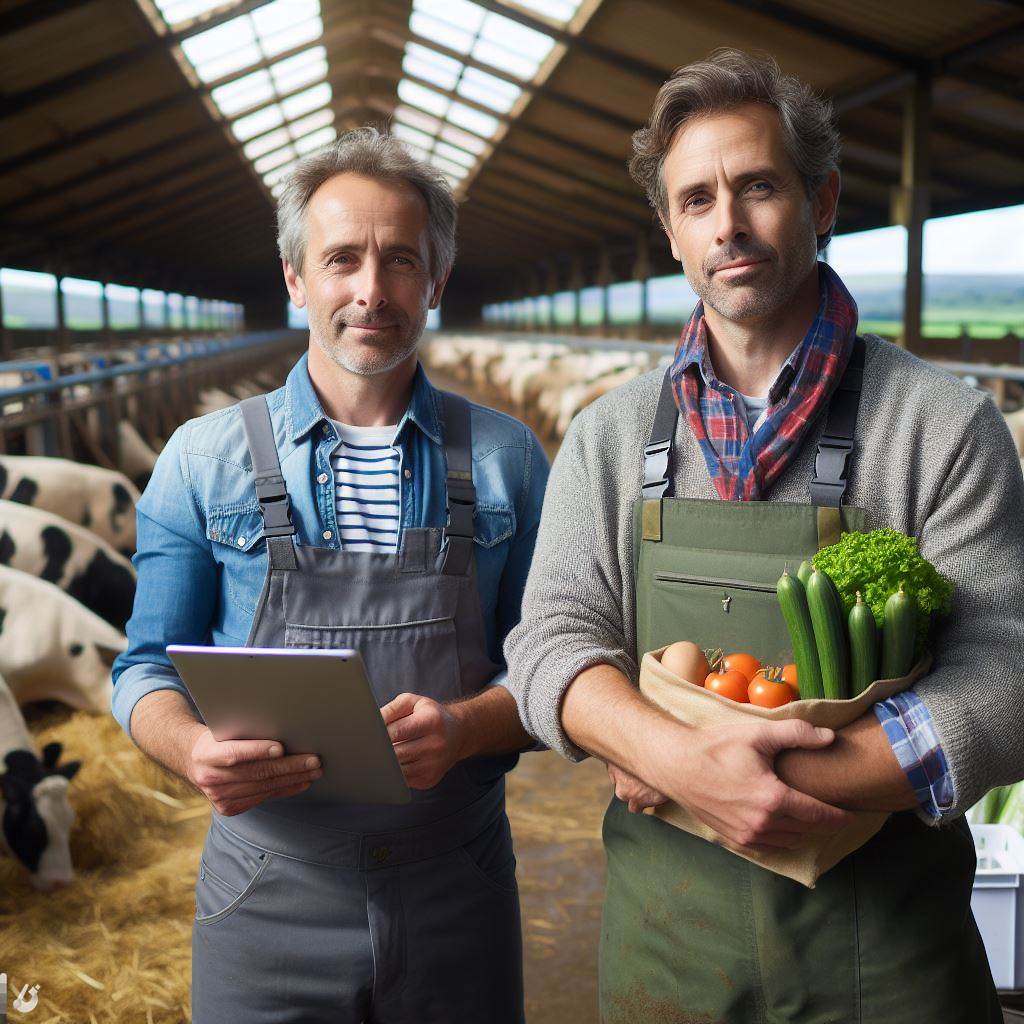Introduction
An Agricultural Manager plays a crucial role in UK’s agricultural industry, overseeing various aspects of farm operations.
Agriculture holds significant importance in the UK economy, contributing billions of pounds annually.
In this blog post, we will delve into a typical day in the life of a UK Agricultural Manager, providing valuable insights into their responsibilities and challenges.
Agriculture is a vital sector in the UK, supporting food production, rural communities, and environmental sustainability.
As an Agricultural Manager, their role involves managing the daily operations of farms, including crop cultivation, livestock rearing, and machinery maintenance.
The UK’s agricultural industry plays a crucial role in the economy. It contributes not only to the nation’s food production but also supports employment, trade, and sustainable land use.
Agricultural activities benefit various sectors, such as manufacturing, retail, and tourism.
This blog post aims to shed light on the diverse tasks and responsibilities that an Agricultural Manager takes on during a typical workday.
From overseeing planting schedules to managing livestock health and welfare, their role requires a broad skill set and a deep understanding of the industry.
The Agricultural Manager actively navigates daily challenges, making decisions to ensure the farm runs smoothly.
Let’s delve into the unique world of a UK Agricultural Manager and gain a deeper appreciation for their pivotal role in this vital sector.
Morning Routine
In the life of a UK agricultural manager, the morning routine is crucial to ensure a productive and successful day. Here is a breakdown of the typical morning tasks:
Start the day early
As an agricultural manager, my day starts bright and early to make the most out of the daylight hours.
Check weather forecast and plan tasks accordingly
Before diving into the day’s activities, I always check the weather forecast to determine how it might impact our farming operations. This allows me to plan tasks accordingly and make any necessary adjustments.
Briefing with the team to discuss daily goals, assignments, and safety measures
Once I have an overview of the weather conditions, I gather my team for a briefing session.
Personalized UK Career Consulting
Receive tailored career guidance designed just for you. Get actionable steps and expert support to boost your career in 1-3 days. Take control of your career now.
Get StartedDuring this meeting, we discuss the daily goals, assign tasks to different team members, and ensure everyone is aware of the safety measures in place.
Conduct inspections on farm equipment and machinery
After the briefing, I move on to conducting inspections on our farm equipment and machinery. This ensures that everything is in proper working order, minimizing the risk of any breakdowns or disruptions during the day.
Monitor livestock health and ensure proper feeding
As an agricultural manager, the well-being of our livestock is a top priority. Therefore, I spend some time in the morning monitoring their health, checking for any signs of illness or distress.
Additionally, I oversee the proper feeding of our animals to maintain their nutritional needs.
By adhering to this morning routine, I can lay a strong foundation for a successful day ahead as a UK agricultural manager.
Field Work
Overseeing and participating in fieldwork activities.
- Supervising planting, irrigation, and harvesting processes.
- Monitoring crop quality and implementing pest control measures.
- Ensuring compliance with environmental regulations and sustainable farming practices.
Oversee and participate in fieldwork activities
As a UK agricultural manager, one of the most important aspects of my job is overseeing and participating in fieldwork activities.
This hands-on approach allows me to stay connected to the land and the crops that we cultivate.
Supervise planting, irrigation, and harvesting processes
When it comes to planting, irrigation, and harvesting processes, I take on the role of a supervisor. I make sure that these activities are carried out efficiently and effectively.
From preparing the soil for planting to ensuring that the crops are harvested at the right time, I am involved in every step of the process.
Monitor crop quality and implement pest control measures
Another key responsibility of mine is monitoring crop quality. I constantly assess the health and growth of our crops to ensure that they are developing as expected.
This involves regularly inspecting the fields, examining the plants for any signs of disease or damage, and taking necessary actions to address any issues that may arise.
Implementing pest control measures is another crucial task on my agenda. I understand the importance of protecting our crops from pests and minimizing their impact on yield and quality.
From using natural predators to applying organic pesticides, I employ various strategies to keep pests under control while minimizing any potential harm to the environment.
Environmental regulations and sustainable farming practices
As an agricultural manager, it is vital for me to ensure that our farming practices comply with environmental regulations and promote sustainability.
Your Dream Job Starts with a Perfect CV
Get a tailored CV and cover letter that captures your unique strengths and stands out in your industry. Let us help you make an unforgettable first impression.
Get StartedI stay up to date with the latest legislation and guidelines, implementing necessary changes to ensure our operations align with them.
From waste management to water conservation, we strive to minimize our environmental footprint and contribute to a greener future.
Field work is an integral part of my role as a UK agricultural manager.
I oversee and participate in fieldwork, supervise planting and harvesting, monitor crop quality, and ensure environmental compliance, crucial for our farm’s success and sustainable practices.
Read: Breeding Techniques: UK Aquaculture Insights
Team Management
As an agricultural manager, one of my key responsibilities is team management. Building and leading a cohesive team is crucial for the success of any farming operation.
Here’s a closer look at how I manage and support my team on a daily basis.
Assign tasks to farm workers and provide necessary instructions
To start each day, I assign tasks to farm workers based on the specific needs of the operation.
This includes tasks such as planting, harvesting, pest control, and equipment maintenance. By ensuring clear instructions are provided, I help the team understand their responsibilities and expectations.
Delegate responsibilities
Delegating responsibilities is another essential aspect of team management. Recognizing the unique skills and strengths of each team member, I distribute tasks accordingly to maximize efficiency.
This ensures that the necessary work is completed promptly and to the best possible standard.
Offer guidance and support to team members
It’s not enough to simply assign tasks and delegate responsibilities. I understand the importance of offering guidance and support to my team members.
Whether it’s sharing best practices, providing training opportunities, or offering advice, I strive to empower my team to perform at their best.
Conduct regular performance evaluations
Regular performance evaluations are crucial for assessing individual and team performance.
Optimize Your LinkedIn for Success
Boost your LinkedIn profile with a professional bio, keyword-rich headline, and strategic recommendations that attract recruiters. Stand out from the crowd and get noticed.
Optimize NowBy evaluating the team’s progress, I can identify areas of improvement and provide feedback to help team members grow professionally.
These evaluations also serve as an opportunity to recognize and reward exceptional performance.
Address any issues or conflicts within the team
Conflicts or issues may arise within a team. In such cases, it’s essential to address them promptly and professionally.
I encourage open communication and ensure that team members feel comfortable sharing their concerns. By addressing issues, I aim to resolve conflicts and maintain a positive and collaborative work environment.
To sum it up, effective team management is central to the success of an agricultural manager.
I assign tasks, delegate responsibilities, guide and support, evaluate performance, and address team issues to foster a productive work environment.
Together, we work towards achieving our farming goals and ensuring the smooth operation of the farm.
Read: Navigating UK Aquaculture: Tech Advancements

Find Out More: Career Spotlight: Women in Forestry
Administrative Duties
Being a UK agricultural manager involves a wide range of administrative duties that are crucial for the smooth operation of a farm. These duties include:
Manage farm finances, including budgeting, bookkeeping, and invoicing
One of the most significant administrative duties of a UK agricultural manager is managing farm finances. This involves several tasks, including budgeting, bookkeeping, and invoicing.
A manager must carefully plan and allocate resources to various aspects of the farm, such as equipment, labor, and supplies.
Develop and implement operational plans and farm policies
Developing and implementing operational plans and farm policies is another crucial administrative duty.
A manager needs to strategically plan and set goals for the farm to achieve optimal performance.
These plans may include crop rotation schedules, livestock management strategies, and production targets. By creating well-thought-out policies, a manager can ensure consistent and efficient operations.
Keep up-to-date records
Keeping accurate and up-to-date records is essential for a UK agricultural manager. This includes maintaining records of crop yields, livestock inventory, and other farm activities.
These records serve as valuable references for future planning, analysis, and decision-making. They enable a manager to identify patterns, analyze performance, and make informed adjustments to optimize operations.
Communicate with suppliers, vendors, and customers
Effective communication with suppliers, vendors, and customers is vital for a farm’s success.
A manager must establish and maintain strong relationships with necessary stakeholders to ensure the seamless flow of resources and products.
Regular communication not only enables swift transactions but also allows for feedback and the resolution of any issues that may arise.
Address any issues or conflicts within the team
To stay competitive in the ever-evolving agricultural industry, a UK agricultural manager must stay well-informed about the latest industry trends and regulations.
By keeping up with new technologies, farming practices, and market demands, a manager can make informed decisions and adapt their operations accordingly.
Staying compliant with regulations is equally important to avoid penalties and maintain a good reputation within the industry.
Generally, the administrative duties of a UK agricultural manager are diverse and crucial for the success of a farm.
Efficiently manage finances, develop plans, and maintain records with excellent organizational skills and communication.
Stay updated on industry trends, ensuring compliance with regulations for effective communication.
With proper administration, a farm can thrive and contribute to the ever-growing agricultural sector in the UK.
Read: Aquaculture Technician: Environmental Impact
Gain More Insights: The Role of Foresters in UK Woodlands
Continuous Learning and Development
In order to excel in the field of agricultural management, it is crucial to constantly enhance one’s knowledge and skills.
Continuous learning and development play a vital role in staying updated with the latest trends and advancements in the industry.
Here are some key ways in which agricultural managers can engage in continuous learning:
Attend Agricultural Workshops, Seminars, and Conferences
Participating in workshops, seminars, and conferences related to agriculture provides invaluable opportunities for agricultural managers to expand their knowledge.
These events bring together experts and professionals from the industry who share their insights and experiences.
By attending such events, managers can gain new perspectives and stay updated on the latest developments in various agricultural domains.
Read Industry Publications and Research Articles
Keeping up with industry publications and research articles is essential for agricultural managers.
These sources provide valuable information about best practices, emerging technologies, and innovative techniques in agriculture.
It is important to regularly read articles and publications from reputable sources to stay well-informed and adapt to changing industry dynamics.
Stay Updated on Technological Advancements in Agriculture
Technology plays a significant role in modern agriculture, and staying abreast of technological advancements is crucial for agricultural managers.
This involves keeping an eye on new software, equipment, and tools that can enhance productivity, efficiency, and sustainability in farming operations.
By integrating cutting-edge technology into their management practices, managers can gain a competitive edge in the agricultural sector.
Seek Networking Opportunities with Other Agricultural Professionals
Networking with other agricultural professionals is a valuable way to exchange knowledge and experiences. It provides an avenue for managers to learn from each other and gain insights into different farming practices.
Attending industry conferences, joining professional associations, and participating in online communities are effective ways to connect with peers and build a strong professional network.
Constantly Adapt and Innovate Farming Techniques to Improve Efficiency and Productivity
Agricultural managers should always strive to improve farming techniques to maximize efficiency and productivity.
This involves embracing new approaches and innovative methods that have proven successful in similar agricultural settings.
By continuously adapting and innovating, managers can optimize resource utilization, reduce waste, and ensure sustainable agricultural practices.
Lastly, continuous learning and development are indispensable for agricultural managers who aim to succeed in their field.
By attending workshops, reading publications, staying updated on technology, networking with professionals, and innovating farming techniques.
Managers can enhance their knowledge, skills, and overall effectiveness in managing agricultural operations.
Read: Species Diversity in UK Aquaculture Tech
Conclusion
The role of a UK Agricultural Manager encompasses various key responsibilities and tasks.
They oversee the planning and coordination of farm operations, manage budgets and resources, and ensure adherence to health and safety regulations.
The challenges faced by Agricultural Managers include dealing with unpredictable weather conditions, market fluctuations, and increasing competition.
However, the rewards are significant, as they contribute to achieving sustainable food production, supporting rural communities, and preserving the natural environment.
If you have a passion for agriculture, I encourage you to explore the field of agricultural management. It offers a fulfilling career where you can make a meaningful impact on the industry.
With the increasing demand for food and sustainable practices, there is immense potential for growth and innovation in this field.
Consider a career in agricultural management, where you can apply your skills in business, problem-solving, and leadership to contribute to the success and development of the agricultural sector.
Embrace the opportunities to work with farmers, scientists, policymakers, and entrepreneurs, and help shape the future of food production.
Agricultural management is not just a job; it is a way of life that connects you to the land and allows you to make a positive difference.
It offers a unique blend of challenges, rewards, and opportunities for personal and professional growth. So, seize the opportunity to be part of this dynamic and vital profession.




